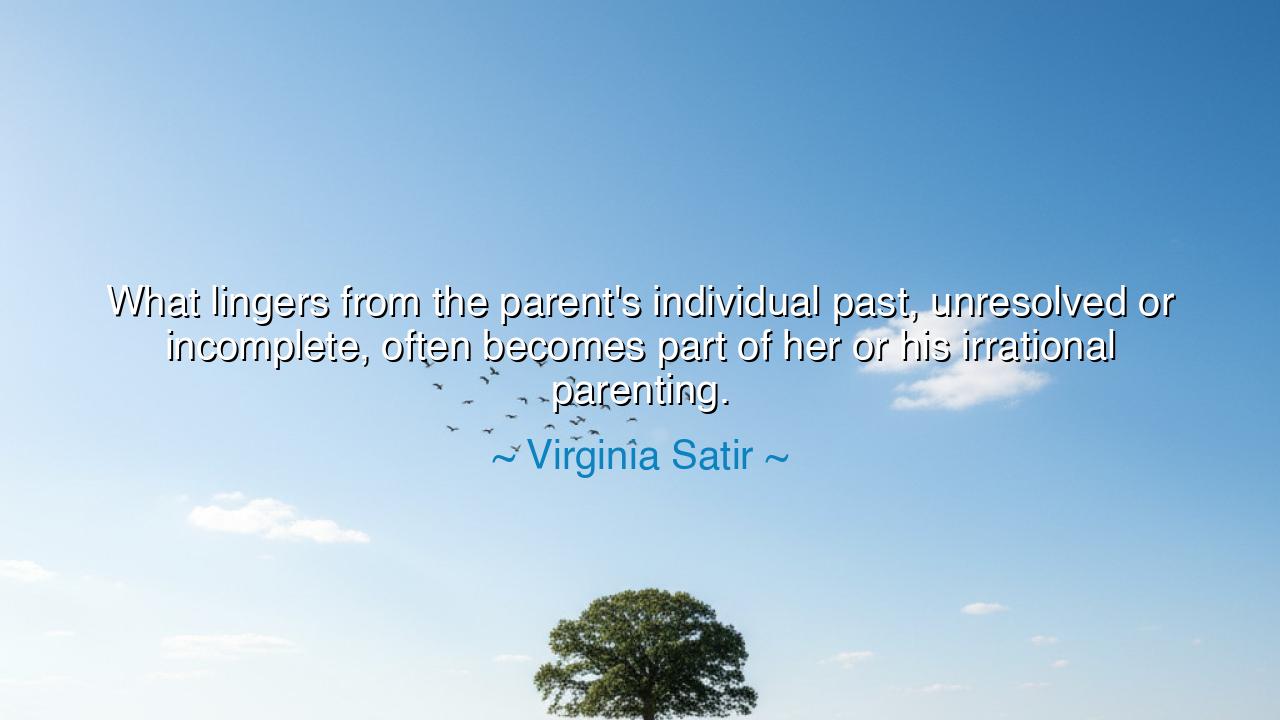
What lingers from the parent's individual past, unresolved or
What lingers from the parent's individual past, unresolved or incomplete, often becomes part of her or his irrational parenting.






The words of Virginia Satir pierce like a lantern into the hidden chambers of the heart: “What lingers from the parent's individual past, unresolved or incomplete, often becomes part of her or his irrational parenting.” In this truth we are reminded that the soul carries its wounds forward, and unless they are faced, they spill into the lives of our children. The past is not buried; it whispers, it shapes, it directs unseen hands. And in the holy work of parenting, the unhealed past may twist love into fear, guidance into control, discipline into anger.
The ancients knew this well, though they spoke of it in the language of curses and inheritances. They taught that the sins of the fathers are visited upon the children—not as divine punishment, but as the natural inheritance of unresolved wounds. If a parent was raised in cruelty, cruelty may live in their hand even when they wish to love. If a parent grew up in neglect, they may fear suffocation or repeat distance without knowing why. Satir’s wisdom unmasks this cycle and calls us to awaken: to heal our past so that our children need not carry its chains.
History offers us vivid proof. Consider the life of Emperor Marcus Aurelius, one of Rome’s wisest rulers. Though he strove for virtue, his son Commodus grew into a tyrant. Many historians see in this tragedy the unspoken truth: Marcus, burdened by his duties and sorrows, could not give his son the presence and guidance that he needed. The father’s unresolved past, his endless discipline of self and suppression of grief, left him unable to fully reach the heart of his child. And Rome bore the consequence. This is Satir’s truth in history’s mirror: what is not healed in one generation may erupt in the next.
Satir’s words also speak with tenderness: parenting is often irrational not out of malice, but out of pain. A mother who was never heard may overprotect, desperate to shield her child from loneliness. A father once shamed may become harsh, fearing weakness in his son. These are acts of love distorted by shadows. The parent is not evil, but unhealed. The key, Satir teaches, is awareness: to see that the battle is not only with the child’s behavior, but with the ghosts of one’s own childhood.
This is why she called healing the family the healing of nations. For every unhealed past is like a seed of sorrow planted in the soil of tomorrow. But when a parent dares to face their wounds, to grieve, to forgive, to seek growth, the cycle is broken. Then love flows untainted, and the child drinks from clear waters instead of troubled streams. Parenting, in this way, becomes not only the raising of children but the redemption of generations.
The lesson is clear: if you wish to raise children in wholeness, look first within. Ask yourself: what still lingers unresolved in me? What fear, what shame, what unfinished grief shapes the way I respond? Do not hide from these questions. Seek counsel, prayer, or reflection. Write, forgive, speak the unspeakable if you must. For every step you take toward healing is a gift not only to yourself, but to your children, who will no longer bear your burdens as their inheritance.
Practically, this means breaking the silence. If your childhood held wounds, do not let them fester unspoken. If anger rises beyond reason, pause and ask where its root lies. Model humility by admitting mistakes, by showing your children that even parents are learners on the path. And seek wisdom—not only from books or teachers, but from your own journey of healing. In this way, you transform irrationality into compassion, and fear into strength.
Thus, Satir’s words must echo like a warning and a promise: “What lingers from the parent's past… becomes part of parenting.” If left unresolved, it binds the next generation. But if faced with courage, it becomes the soil from which new love and wisdom grow. Let us, then, break the cycle, so our children may inherit not our wounds, but our healing.






AAdministratorAdministrator
Welcome, honored guests. Please leave a comment, we will respond soon